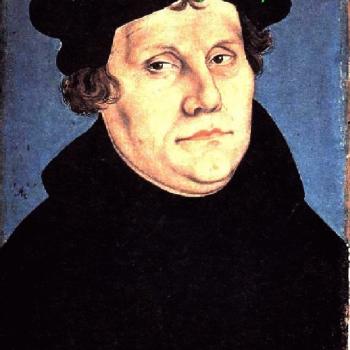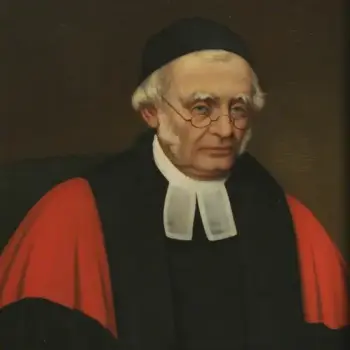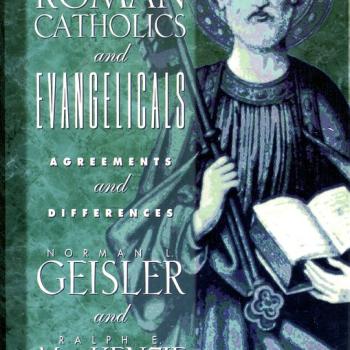Chapter 9 (pp. 65-85) of my book, Reflections on Radical Catholic Reactionaries (December 2002; revised second edition: 17 August 2013; slightly revised again in November 2023 for the purpose of the free online version). Anyone who reads this book should first read the following three introductory articles, in order to fully understand the definitions and sociological categories I am employing:
Introduction (on the book page)
Definitions: Radical Catholic Reactionaries, Mainstream “Traditionalists,” and Supposed “Neo-Catholics” [revised 8-6-13]
Radical Catholic Reactionaries: What They Are Not [9-28-21]
If you’re still confused and unclear as to my meanings and intent after that, read one or more of these articles:
Rationales for My Self-Coined Term, “Radical Catholic Reactionaries” [8-6-13]
My Coined Term, “Radical Catholic Reactionary”: Clarifications [10-5-17]
Clarifying My Coined Term, “Radical Catholic Reactionary” [4-3-20]
This book is modeled after the method and structure of the French mathematician and Catholic apologist Blaise Pascal’s classic, Pensées (“thoughts”). Catholic apologist and philosopher Peter Kreeft described this masterpiece as “raw pearls” and “more like ‘sayings’ than a book . . . ‘Sayings’ reflect and approximate the higher, the mode of Christ and Socrates and Buddha. That’s why Socrates is the greatest philosopher, according to St. Thomas (S.T. III, 42, 4).”
*****
- Ecumenism can be traced to many kernels in Catholic tradition, most notably with the acceptance by St. Augustine and the Church, of Donatist baptism. The Donatists were formal schismatics, yet the Church accepted the validity of their baptism (just as with Protestants today).
- Radical Catholic reactionaries argue that ecumenism undermines, and is contrary to, evangelism and apologetics. It does not at all — the two goals being distinct and complementary endeavors, not contradictory ones. I rejoice in the truths that we share with our Protestant and Orthodox brothers and sisters in Christ; at the same time, we try our best to convince them that the Catholic Church is the fullness of the faith.
- Reactionaries claim that St. Thomas Aquinas would have rejected modern-day ecumenism. It can readily be granted that he didn’t understand it in the 21st century sense, any more than he accepted — let alone understood — the Immaculate Conception. It took the non-Thomist Blessed Duns Scotus to fully develop that. But ecumenism can be developed from the seed of St. Thomas’s teachings about the culpability and/or good faith of non-Catholics and non-Christians; just as it can be developed from St. Augustine’s approach to the Donatists, and the controversy over re-baptism — or for that matter, from our Lord’s dealings with Samaritan women and Roman centurions. We wouldn’t expect a figure from seven centuries earlier to fully grasp what has developed in the interim. The key is the nature of development of doctrine. Many developments would seem foreign to those from centuries earlier. But St. Thomas did teach on this general subject:
With regard, however, to Cornelius, it is to be observed that he was not an unbeliever, else his works would not have been acceptable to God, whom none can please without faith. Now he had implicit faith, as the truth of the Gospel was not yet made manifest: hence Peter was sent to him to give him fuller instruction in the faith. (Summa Theologica, II II q. 10 a. 4 ad 3 — in some editions ad 4)
- Many reactionaries labor under the illusion that Vatican II ecumenism and indifferentism are identical. That can be easily refuted from the council documents themselves (so easily that there is no need to do so here).
- The ecumenical councils of Lyons and Florence also included reconciliation with the Orthodox, which might be regarded as precursors to Vatican II ecumenism. One can always find pre-conciliar popes and aspects of former councils espousing what is allegedly so hideous in Vatican II.
- Reactionaries are always decrying what they call a “false ecumenism” — often equating it with indifferentism or relativism. My question to them, then, is: what is considered true ecumenism? If there is no such thing, then why qualify the word? That would be like saying “avoid a false lust” or “don’t engage in false embezzlement.” The use of false, therefore, implies the existence of a true (authentic) ecumenism, as in the teaching of Vatican II.
- The so-called “innovations” of Vatican II concerning religious liberty are merely a return to the status quo of the early Church, over against the Church of the High Middle Ages. The council, in decreeing this, lends its authority to the current “move” of the Holy Spirit towards more tolerance and ecumenism, while not compromising or sacrificing doctrine in the process. Therefore, the Vatican II emphasis on religious liberty is not a corruption or reversal of previous tradition, since this was the primitive (apostolic) tradition, and since application of it may vary, according to times and places (since it is not a dogmatic question).
- Likewise, the Church has recently opposed capital punishment, which is not intrinsically morally impermissible. What is thought to constitute legal and societal justice, with regard to criminals (and formerly, also heresy) has obviously changed, from the times of the Crusades and Inquisition. In any event, this (like the religious liberty issue) also involves no dogma of the faith, or proclamations of a complete “reversal” of doctrine and precedent.
- The reactionary has to demonstrate that ecumenism and religious liberty are total corruptions of Catholic tradition. If they cannot do that, then they would then be part and parcel of the ordinary and universal magisterium.
- I don’t think reactionaries “get it” with regard to ecumenism. They don’t seem to make the necessary (elementary) distinctions, and jumble things and ideas together that don’t belong together. There are liberal distortions and reactionary distortions of ecumenism. The liberals get more and more heterodox and New Age, and the reactionaries become more and more conspiratorial and exclusivistic; almost Pharisaical at times, in their strong tendencies towards absurd, short-sighted hyper-legalism.
- I question whether many reactionaries even understand the true nature of legitimate Catholic ecumenism. They must first understand that in order to have a substantive opposing position (which is itself highly imprudent, as a Catholic must give assent to the Church’s teaching). We often observe a constant vapid equation of ecumenism with indifferentism. As the latter is clearly rejected by the Church, the criticism collapses as irrelevant; a non sequitur. Yet it is constantly made. This suggests that the real problem is found in the prior attitude of the reactionary and his fallacies and Protestant-like false dichotomies, not in the teaching itself, since the very thing harped on is already dealt with in the documents themselves. Reactionaries see in documents of Vatican II and papal and Church actions what they want to see. What they miss is the responsibility to give assent to what the pope (and the council) is teaching.
- As for the never-ending trashing of the reactionary critics of the Assisi I and II ecumenical gatherings, they need to show from actual proclamations by the pope and other Catholics, that the faith and Vatican II-type ecumenism was compromised. Instead, we observe a lot of hysterical alarmism that presupposes certain fears and suspicions from the outset and then interprets the proceedings accordingly. That is singularly unimpressive and unpersuasive. Thus we see reactionaries – like one person from a prominent reactionary website/newsletter, who went to the second ecumenical gathering at Assisi as a reporter to heap scorn upon the proceedings and present it according to his warped, preconceived (false) notions of its intent and goal and underlying impulses.
- Reactionaries tell us that many of the faithful are confused by things like Assisi I and II and the Pope kissing the Koran, etc. But lots of things in Catholicism are confusing, as it is on a very high level, spiritually and intellectually. The Trinity is very confusing. The hearers of Jesus’ discourse from John 6 were very confused, too, including virtually all the disciples. So what? Luther was very confused about the biblical symbiotic relationship between faith and works. Ignorance is changed by education, not sugar coating possibly difficult-to-understand teachings and actions. The complexity and depth of the Catholic Church is its unique glory. The deepest spiritual and theological truths aren’t all that simple.
- I was asked if I would “kiss a book that denied the divinity of Christ” (referring to Pope St. John Paul II’s kissing of the Koran). I replied: Would you vote for a candidate who allowed abortion in cases of rape and incest? Would you pray with a Protestant (or a Jew) at a school commencement or at a family picnic? Once I prayed with a Muslim Imam at a George Bush rally. Does that make this man a Christian (or terribly compromised), because he prayed with a majority Christian crowd? Of course not. Does that make me (along with hundreds of other Christians there) a Muslim and mean that I deny the divinity of Jesus? Again, of course not. Or did I deny the divinity of Jesus without knowing it? Reflective adults immediately realize that such joint endeavors are based on the common ground we have, while at the same time acknowledging self-evident differences.
- I was also asked if I would “kiss the writings of Arius.” I replied that it is not a direct analogy, because one is a heresy and corruption of Christianity, whereas the other (though still ultimately incorrect in many ways) is a separate religion altogether. Would a reactionary kiss the Hebrew Bible? Would he kiss the famous scroll of Isaiah from the Dead Sea Scrolls? No? Why? Yes? Then they are (by their own false reasoning) accepting an incomplete, Christ-less religion and denying key tenets of Christianity.
- Apparently, reactionaries accept Vatican II, with the exception of the following clauses about Islam, Judaism, and other religions, from Nostra Aetate (more of the pick-and-choose cafeteria Catholicism of the modernists, and private judgment of Protestants?):
The Church has also a high regard for the Muslims. They worship God . . . They strive to submit themselves without reserve to the hidden decrees of God . . . The sacred Council now pleads with all to forget the past, and urges that a sincere effort be made to achieve mutual understanding . . . (3)
The Church, therefore, urges her sons to enter with prudence and charity into discussion and collaboration with members of other religions. (2)
The sacred Council now pleads with all to forget the past, and urges that a sincere effort be made to achieve mutual understanding; for the benefit of all men, let them together preserve and promote peace, liberty, social justice and moral values. (3)
Since Christians and Jews have such a common spiritual heritage, this sacred Council wishes to encourage and further mutual understanding and appreciation. This can be obtained, especially, by way of biblical and theological enquiry and through friendly discussions. (4)
- When a layman disagrees with the Holy Father on matters of prudence, I go with the pope, all things considered. When a reactionary disagrees with the decree of an ecumenical council, ratified by a pope, on matters of ecumenism, I — with all due respect — go with the council. The Muslims often do a better job than Protestants and liberal, nominal Catholics when it comes to sexual morality, the wrongness of contraception and abortion, pornography, divorce, and homosexuality, and in their (bizarre, strange) behavior of continuing to want to have large families with two parents of a different gender. But let’s simply war against them (as an entire class of people – not referring to the opposition of extreme lunatic terrorists), rather than work together to fight the evils of Communism, humanism, terrorism, radical feminism, unisexism, widespread abortion and euthanasia, and sexual debauchery and degeneracy. Let’s never work together for a better world, based on the many values that we hold in common. That would never do; we don’t want that.
- I don’t think reactionaries fully understand paradox, nuance, and the complex balances which Catholic teaching require. Ecumenism does not negate apologetics. Partial truth in another religion does not contradict fullness of truth in Catholicism. It isn’t a zero-sum game, as if no other belief-system has any truth and all are worthless, simply because we possess the fullness of it. Reactionaries again show their affinity to the thought-processes of Martin Luther, who also had this irritating tendency of creating false tendencies: man has a sinful tendency, therefore he is totally depraved, and even good acts are sinful; God is sovereign, therefore man has no free will. Etc., etc.
- Authentic Catholic ecumenism is the effort to find as much common ground and common cause with all our religious brethren as we can, and as much “oneness” — without compromise of doctrine or what we believe to be apostolic tradition; and also to understand and frankly acknowledge where we disagree, and to establish respect and fellowship (with fellow Christians). I think charity and common-sense ethics demand that, and I believed the same as an evangelical. I don’t think it is ever good to stop talking to and dialoguing with people of good will. It in no way necessarily implies an “indifferentism” or religious relativism (as many Catholic liberals and their liberal Protestant cronies have distorted the endeavor to mean). With the Jews and Muslims, ecumenism is more or less diplomacy and good will, and co-belligerency against the evils of our time wherever possible (e.g., the Muslims and Orthodox Jews agree with us on contraception and abortion and other traditional family issues), as well as the condemnation of hatred, mutual suspicion, etc.
- Why can’t we join together with other Christians (even those of other religions) in all the areas that we hold in common (especially morality, in this day and age)? I think we’re all too used to (and rightly sick of) the ersatz, fake ecumenism of the liberals, where nominal religionists agree to find togetherness in their unbelief and skepticism. That requires neither guts, ingenuity, nor effort. That’s not the Catholic or Vatican II approach at all, nor is it the least bit impressive or appealing. What’s so profound about agreeing on things that are already agreed upon?
- One reactionary disdainfully remarked that “the typical neo-Catholic will snuggle up with persons who have no interest in joining their religion.” I replied: You mean the way that Jesus snuggled up to the Roman centurion?: “Truly, I say to you, not even in Israel have I found such faith . . . Go; be it done for you as you have believed.” (Matthew 8:10, 13). Jesus uttered not a word about the gospel or believing even in the Jewish Torah, let alone the full-bodied message and dogma of Christianity.
- Reactionaries (like many Calvinists and Protestant fundamentalists) take a dim view of the notion that people will be judged, in part, according to how much they know and don’t know about Christianity or Catholicism. But this is eminently biblical:
But he who did not know, and did what deserved a beating, shall receive a light beating. Every one to whom much is given, of him will much be required; and of him to whom men commit much they will demand the more. (Luke 12:48)
. . . we who teach shall be judged with greater strictness. (James 3:1).
And you, Capernaum . . . If the mighty works done in you had been done in Sodom, it would have remained until this day. But I tell you that it shall be more tolerable on the day of judgment for the land of Sodom than for you. (Matthew 11:23-24)
. . . although they knew God they did not honor him as God or give thanks to him . . . (Romans 1:21)
If they do not hear Moses and the prophets, neither will they be convinced if some one should rise from the dead. (Luke 16:31)
We believe that we have the fullness of salvation. That doesn’t mean that all who are not formal members of the Church will go to hell. The Church has never taught that. No one is saved outside the Church, in one sense, but they can possibly be in another sense. Both truths have been held in paradox. One cannot take one to its extreme and deny the other. This is no modern innovation of liberalism or Vatican II. It goes back to Jesus, St. Peter, St. Augustine, and St. Thomas Aquinas.
- The Second Vatican Council — contrary to uninformed reactionary claims – repeatedly stressed that there was no salvation outside the Church and that the Catholic Church possessed the fullness of salvation:
Yet she proclaims and is in duty bound to proclaim without fail, Christ who is the way, the truth and the life (Jn 1:6). In him, in whom God reconciled all things to himself (2 Cor 5:18-19), men find the fulness of their religious life. (Nostra Aetate [Declaration on the Relation of the Church to Non-Christian Religions], section 2; p. 739 in Flannery edition)
This motif is all through Unitatis Redintegratio. If one can miss this crucial element — which some reactionaries incredibly claim is “missing entirely” from this Decree on Ecumenism –, then one can miss the sun in a clear sky in summer at high noon. I shall cite just a few statements:
Christ the Lord founded one Church and one Church only. (1)
. . . division openly contradicts the will of Christ, scandalizes the world . . . (1)
The sacred Council . . . has already declared its teaching on the Church . . . (1)
In this one and only Church of God . . . the Catholic Church . . . (3)
. . . written Word of God; the life of grace; faith, hope, and charity . . . All of these . . . belong by right to the one Church of Christ. (3)
For it is through Christ’s Catholic Church alone, which is the universal help towards salvation, that the fullness of the means of salvation can be obtained . . . the one Body of Christ into which all those should be incorporated who belong in any way to the people of God. (3)
. . . little by little, as the obstacles to perfect ecclesiastical communion are overcome, all Christians will be gathered . . . into the unity of the one and only Church, which Christ bestowed on his Church from the beginning. This unity, we believe, subsists in the Catholic Church as something she can never lose, and we hope that it will continue to increase until the end of time. (4)
Their ecumenical activity cannot be other than fully and sincerely Catholic, that is, loyal to the truth we have received from the Apostles and the Fathers, and in harmony with the faith which the Catholic Church has always professed . . . the reconciliation of all Christians in the unity of the one and only Church of Christ . . . (24)
Likewise, Lumen Gentium states, among other things: “This is the sole Church of Christ . . . This Church, constituted and organized as a society in the present world, subsists in the Catholic Church.” (8) / “. . . that all may be peaceably united, as Christ ordained, in one flock under one shepherd.” (15)
- In 1937, Pope Pius XI, in his encyclical, Divini Redemptoris, wrote:
Against the violent effort of the powers of darkness which would snatch from the hearts of men the very idea of God, we hope very much that Christians shall come and join all those who, and they are the greater part of humanity, believe that God exists and who adore him.
- Indifferentism is a mindset and procedure in which ostensible differences (usually no longer held in fact) are papered over in a quintessentially liberal ersatz relativistic nominalism, masquerading as feel-good “unity.” Orthodox Catholic ecumenism, on the other hand, is holding strongly and never yielding one’s “orthodox” belief, and not denying real, heartfelt differences in the slightest, yet simultaneously seeking to achieve whatever unity, acknowledgment of common ground, fellowship, and social and political cooperation that is possible with one’s Christian brethren. This is required of every Christian, in light of the very strong scriptural injunctions towards unity, especially John 17.
- Reactionaries claim that by attending a Protestant church service, we are, in effect, demonstrating that we agree with all their teachings and beliefs. This may be the impression of some, but it is by no means clear-cut. To use a personal example, I attended my niece’s confirmation at a Lutheran service. To not do so would strike me as uncharitable and smacking of spiritual arrogance (or at least perhaps leaving that impression). I didn’t partake of the communion, and did nothing contrary to my beliefs while there — and a great deal fully consistent with my Catholic beliefs (I used to attend this church as a Protestant, and in fact it played a large role in my evangelical conversion of 1977). This is not a compromise, and Catholics are not absolutely forbidden to attend Protestant services; rather, we are advised to use our judgment, discretion, and prudence. I went to my mother’s Methodist church on Mother’s Day one year. This meant a great deal to her. She knew full well I disagreed with some things, but that was quite beside the point. All three of her children were worshiping God with her in her own church, for the first time in many years. I don’t think God is concerned about that sort of thing, to put it mildly. But the devil would love to get Christians stirred up in opposition to it, because “divide and conquer” is one of his successful strategies.
- Protestants and Orthodox are not — strictly speaking — “outside the Catholic Church.” The Decree on Ecumenism, from Vatican II (I, 3) states:
One cannot charge with the sin of separation those who at present are born into these communities and in them are brought up in the faith of Christ, and the Catholic Church accepts them with respect and affection as brothers. For men who believe in Christ and have been properly baptized are put in some, though imperfect, communion with the Catholic Church . . .
[A]ll who have been justified by faith in baptism are incorporated into Christ; they therefore have a right to be called Christians, and with good reason are accepted as brothers by the children of the Catholic Church. “Moreover, some, even very many, of the most significant elements and endowments which together go to build up and give life to the Church itself, can exist outside the visible boundaries of the Catholic Church: the written Word of God; the life of grace; faith, hope and charity, with the other interior gifts of the Holy Spirit, as well as visible elements. All of these, which come from Christ and lead back to him, belong by right to the one Church of Christ.
This doesn’t mean that we cease from trying to vigorously persuade non-Catholics that the fullness of apostolic Christianity resides in the Catholic Church. There is always a certain tension or paradox between ecumenism and apologetics, but as Catholics we are commanded to engage in both endeavors. It isn’t optional.
- Reactionaries act as if mere presence at a Protestant service or cooperation with Protestants on any number of joint endeavors, is a total acceptance of their doctrines. If that were the case, I could do little at all in this world, since I can always find something to disagree with — ethically or doctrinally. I would scarcely be able to leave my home. I could never set foot in a house of fornicators, or talk to pro-abortionists, or give a gift at Christmas to a drug addict or glutton or greed-filled man, or fellowship with Orthodox, since they sanction things I regard as mortal sin (divorce and contraception), etc. But my Bible teaches me that Jesus Himself would do all these things. The apostles went to the synagogues until they were kicked out. The burden of proof is on the reactionary to show that contact with anyone who disagrees to the slightest degree theologically is utterly impermissible. I maintain that it is neither biblical nor in line with the demands of charity. We have the example of Jesus eating in sinners’ houses. He ate the Last Supper with Judas (knowing all things). I think that is sufficient. The real ecclesiological and theological issues are made even more difficult to resolve by such a foolish and uncharitable stance of rigid inflexibility: assuming something is a principle when it is not, and is in fact merely Pharisee-like legalism and obscurantism.
- There is a delicate balance between ecumenism and apologetics. The former without the latter degenerates into liberalism, indifferentism and relativism. The latter without the former is hard-hearted, overly rationalistic, dry-as-dust ivory tower Christianity. As always, Catholicism takes a “both/and” approach. We are not beholden to intellectual and cultural fads and fashions.
- Since some reactionaries imply that Vatican II suddenly changed everything for Catholics with regard to ecumenism, it is helpful to explore what the Catholic Church was teaching along these lines in the three or four generations before the council. Catholic thought has developed in this area (just as it has in many — if not all — areas), especially in the last fifty years or so, during which time the development has been noticeable and rapid. But fairly explicit precedent exists for such ecumenism at least as far back as Pope Leo XIII (r. 1878-1903), who tried to encourage an attitude of respect and friendship with regard to the Churches of the East. In his encyclical, Praeclara Gratulationis [1894], he used expressions that had previously rarely been seen in papal documents:
We cast an affectionate look upon the east . . . the Eastern Churches, so illustrious in the ancient faith and glorious past . . . the distance separating us is not so great . . .
Leo XIII never calls the Orthodox, or speaks of them, as schismatics. He tries to describe the schism in a way that — though faithful to his own Catholic convictions — is not insulting or condescending towards the Eastern Orthodox Christians. For Leo XIII the Orthodox are separated Christian, or “dissident Christians.” He stresses that unity becomes more glorious and attractive if it encompasses a great diversity of liturgical and ecclesiological rites, customs, and forms. This ecumenical approach taken by Leo XIII has been highly influential on the policy of the papacy ever since. In all the documents on the Eastern Churches since his time, we find a friendly tone, a call to unity and reconciliation and mutual respect, and a formal recognition of the Eastern Orthodox traditions.
- With Pope Pius XI (r. 1922-1939), the ecumenical outlook with regard to Eastern Orthodox Christians becomes even more explicit. For the first time, the official documents of the Catholic Church confess that the barriers to reconciliation and reunion are not all caused by the Orientals . . . In Rerum Orientalium (1928), he states:
The remedy for the great ills of separation cannot be applied unless the impediment of mutual ignorance, contempt, and prejudice be first removed. . . .
Ven. Pope Pius XII (r. 1939-1958) more openly foresaw the blessings that unity could bring to the universal Church, East and West.
- Equally remarkable is the increasing openness in the approach to Protestants from recent popes. This development has been slower than that towards the Orthodox, but it does undeniably exist and can be demonstrated. Pope Leo XIII addressed many letters to Protestant Christians in which he avoided the insulting vocabulary of the past. He never referred to them as heretics, and referred to them as separated Christians. Leo XIII’s desire for unity included Protestants. He was a key player in several movements of prayer for unity, and he sought formulas of unity that would be agreeable to both Catholics and Protestants.
- In official Church documents, the development of the “modern” ecumenical outlook with regard to Protestants is notable in the thought of Ven. Pope Pius XII. In his first encyclical, Summi Pontificatus (1939), a new motif is emphasized:
We cannot pass over in silence the profound impression of heartfelt gratitude made on us by the good wishes of those who, though not belonging to the visible body of the Catholic Church, have given noble and sincere expression to their appreciation of all that unites them to us, in love for the person of Christ or in belief in God.
- The constant reference to Protestants as separated brethren in Venerable Pope Pius XII is striking, since it assumes what older Church documents were not so willing to grant: the good will on the part of non-Catholic Christians. In the writings of Ven. Pope Pius XII it is presumed that many — perhaps most – Protestant Christians are outside the Church without guilt. In other words, they are not heretics (especially in the subjective sense), but rather, separated brethren. They have faith in God and his Son Jesus Christ, and many spiritual attributes that give them a profound affinity with Catholics and the Catholic Church.
- The notion that Protestant Christians have access to real faith (the faith that justifies), to grace, and the same God, has been implicit in the principles of Catholic theology at all times (which is why ecumenism is a consistent development and not a novel innovation, or corruption). In the writings of great converts such as Newman, Manning, Chesterton, and Knox — Catholics who remembered their own previous states of mind — we find this ecumenical outlook stated clearly.
- On the Ecumenical Movement was published by the Holy Office in 1949. It allowed Catholics, with the approval of their bishop, to participate in theological dialogue with Protestant Christians. This was an official Catholic recognition of the ecumenical movement. The document permitted ecumenical gatherings to be opened and closed with common prayer.
- All of the Catholic ecumenical development surveyed above, occurred in the 80 years between the time of the pontificate of Leo XIII (from 1878) up through the reign of Ven. Pope Pius XII (who died in 1958). The well-known, extensive, and profound ecumenical efforts of Pope St. John XXIII, who called the Second Vatican Council, are not even included. Clearly, ecumenism has been the noteworthy and remarkable Catholic development of our times, even surpassing mariological development, whose explicit roots go back considerably further than modern Catholic ecumenism does. Ecumenism, though new in many ways, is nevertheless a legitimate development of Catholic theology and thought; one with an explicit history that precedes Vatican II by many centuries, and often seen in Holy Scripture as well.
- The Second Vatican Council was not the triumph of liberalism and indifferentism, liturgical mediocrity, and situation ethics; nor was it a radical change of direction. Quite the contrary: it was perfectly orthodox and consistent with preceding developments and trends. The Donatists, too, were institutionally outside of the Catholic Church. But the Church – all the way back in St. Augustine’s time (d. 430) — determined that their baptism was valid, and that individual Donatists didn’t need to be baptized upon conversion to Catholicism. This is precisely the same fundamental and sacramental principle by which we declare that Protestants are baptized into the Body of Christ, and are therefore a part of the One True Church in some imperfect fashion.
- Reactionaries almost totally misunderstand the ecumenical language of Vatican II. The council is not agreeing with Buddhism or Islam or any other religion per se; rather, it is merely recognizing the sincere and worthy goals to be found in almost all world religions. This is diplomatic, conciliatory language. It is obviously an attempt to find common ground with other religions — not an exercise in indifferentism or relativism. Reactionaries needn’t create a contradiction where, in fact, two ideas are complementary. Those who are predisposed to be critical of Vatican II often find in it what they wish to find, but in so doing, they make their bias evident to all.
- Nostra aetate (Declaration on the Relation of the Church to Non-Christian Religions), from Vatican II had a particular purpose. The key phrase in the document is: “The Catholic Church rejects nothing of what is true and holy in these religions.” In other words, what is true is good (and that is what is discussed), and can be gladly acknowledged. The errors are, of course, harmful. It is not the function of this particular document to document those. But it is not an indifferentist document (see #164 above).
- The reactionary could, I suppose, argue (similar in spirit to a sectarian Protestant fundamentalist) that all religions besides Catholicism are thoroughly evil, through and through, but this is patently (and I think, obviously) false. St. Paul engaged in a tactic not unlike the document Nostra aetate, in his sermon on Mars Hill, in Athens (Acts 17). He cited pagan poets and philosophers, and the “tomb of the unknown god,” rhetorically built upon them, and proceeded to make the case for Christianity. So he engaged in both ecumenism and apologetics, consecutively. It is difficult to do them simultaneously, just as a prophet cannot easily bring forth a message of love and pastoral concern, and a scathing jeremiad, at the same time.
- Furthermore, St. Paul teaches the notion that much good can be found outside of the “law” (by extension, the Church) in Romans 2:12-16 (cf. 3:29). This is nothing new in Catholic teaching. Ecumenism finds its roots right in Holy Scripture. This incorporation of what was true and good in pre-Christian religion was also very much in evidence in the Virgin Mary’s appearance at Guadalupe — perhaps the greatest and most rapid mass conversion of all time. St. Justin Martyr (d. c. 165) wrote:
Those who lived according to Logos are Christians, even if they were considered atheists, as among the Greeks, Socrates and Heraclitus. (Apology, I, 46)
St. Augustine agrees:
From the beginning of the human race, whoever believed in Him and understood Him somewhat, and lived according to His precepts . . . whoever and wherever they may have been, doubtless were saved through him. (Epistle 102, 12)
- The reactionary anti-ecumenical argument (especially against the two ecumenical gatherings at Assisi) ironically reduces logically to a curious version of the tired anti-Catholic Protestant objection that Catholicism is deliberately compromised with paganism. Like the Protestant charge, it is based on a thorough (and rather elementary) misunderstanding, and is a house of cards with no foundation.
- Pope St. John Paul II kissed the Koran, in an ecumenical, diplomatic gesture. Reactionaries have maintained that this was imprudent and scandalous, even if the Holy Father didn’t intend to convey agreement with Islam. They argue that such an action was bound to be misunderstood; therefore, shouldn’t have been done in the first place. Yet, many things in the Catholic Church are gigantically misunderstood. If we stopped doing and believing things for that reason, we could do little except be “mere Christians” and “skeletal Christians,” as I like to call a certain sort of minimalistic, least-common-denominator sort of Christianity. The Marian doctrines are severely misunderstood. Should we, then, not proclaim them, and refuse to participate in Marian devotion? How many Protestants believe in or understand the Immaculate Conception or the Assumption of the Blessed Virgin? Should we then throw these beliefs out? Should we totally rule out the possibility of the pope defining Mary-Mediatrix for the same reason (and I speak as an “inopportunist” myself, though I accept the doctrine). A full-blown Mariology (even already-defined Marian doctrines) “suggests” a bunch of false ideas to a bunch of folks, too. Moreover, we know that our Lord Jesus was often misunderstood. One could make a similar argument of, “why did Jesus do that?” — say, forgiving the adulteress, or turning the tables in the Temple – “It was terrible PR . . . ,” etc.
- I think it is utterly obvious that the pope’s kissing of the Koran didn’t suggest carte blanche approval; it merely meant acceptance of those things which are true in the Koran, per Vatican II directives on ecumenism, and Pope St. John Paul II’s many comments in this vein. In other words, his actions have to be interpreted in light of his overall teaching, and that of the Church, as crystallized especially in Vatican II. Many reactionaries – quick to draw the most cynical, skeptical, critical conclusion, refuse to do that.
- The pope also sometimes kisses the ground in America and other countries when he enters them. Does that mean he sanctions legal abortion or (from 1993-2001) the presidency of Bill Clinton, with all that it represented? Clearly not. These are diplomatic gestures, born of charity and good will, not exhaustive doctrinal agreement. Kissing the ground or perhaps a dignitary (in some cultures) does not mean total approval of that person or his country. If it did, then there could be scarcely little diplomacy at all. If every handshake, hug, or kiss meant what reactionaries have to imply for their argument to succeed, we would never end any wars (by diplomatic means) or have any treaties. Did the pope shake hands with Castro when he visited Cuba? I assume that he did. I doubt that I could have done so myself, but then I am not a world leader, whose job requires such delicate gestures at times, for the sake of peace, unity, and understanding.
- Every conciliatory and “unitive” act must be understood within the prior assumption of theological and philosophical differences. These are presupposed throughout, whereas in indifferentism they are cast to the wind. True, the outsider can’t always know this from observation, but truth is sometimes complex.
- What if the pope kissing the Koran (theoretically) stopped a war? Would that be a valuable end? Would the reactionary critic of the pope rather be a Crusader going in to do battle with Muslims, or a St. Francis of Assisi, who tried to talk to them, did miracles, and profoundly impressed Muslims in so doing? An easy choice . . .
- Certain gestures (in this case, kissing a book) have a wider “application” than just the liturgy, so that the analogy to the liturgy is not “exclusive.” Genuflecting (apart from the sign of the cross) is similar to curtseying or bowing before a king. There is overlap. Therefore, it is just as reasonable or proper to make an analogy to kissing the ground (with all that that means and doesn’t mean), as it is for reactionaries to make an analogy to kissing the gospels in the Mass. I would maintain that the more fitting or obvious analogy is to another country, since we are dealing with another religion, and indeed another supposed “revelation.” Meeting with Muslims is nothing like a Mass at all.
- At the Assisi ecumenical gatherings, there weren’t common prayers undertaken by those of different religions. There were simultaneous prayers offered. This is a crucial distinction, and one that disintegrates much of the almost hysterical reactionary critique against these undertakings.
- Prohibition of meeting with non-Catholics is a prudential, disciplinary matter. It may have been wise during the 16th century, but hopefully the Church has become a little more confident, so that we don’t have to fear being overcome by every non-Catholic argument. If we are to reach non-Catholics, we have to talk to them, truly respect them insofar as we can, and love them. We can hardly do so by an absolute refusal to engage in any common activities. Nothing in true ecumenism, therefore, is unbiblical (e.g., the Samaritan woman, the Roman centurion, the initial outreach to the Gentiles) or un-Catholic (the Donatists; the acknowledgment of Protestant baptism and Orthodox sacraments). It isn’t an eternal dogma that Catholics can’t talk to or fraternize with non-Catholics. How could we evangelize or teach about the fullness of the Church if this were an absolute? We couldn’t even say grace at a family reunion, or listen to an invocation at a commencement ceremony (as some anti-ecumenical sorts of Orthodox Christians have indeed argued).
- If Pope St. John Paul II’s kissing of the Koran was done only in the company of one, or a few, then obviously it was not intended for “public consumption.” As such, it seems to me that much of the reactionary argument about it causing scandal and stumbling to the “faithful” collapses, as it was something done in private in the first place.
*****
Photo credit: annegaellecahuzac (1-12-17) [Pixabay / Pixabay Content License]
*
Summary: Chapter 9 of my book, Reflections on Radical Catholic Reactionaries (December 2002; revised in November 2023 for the purpose of the free online version).














